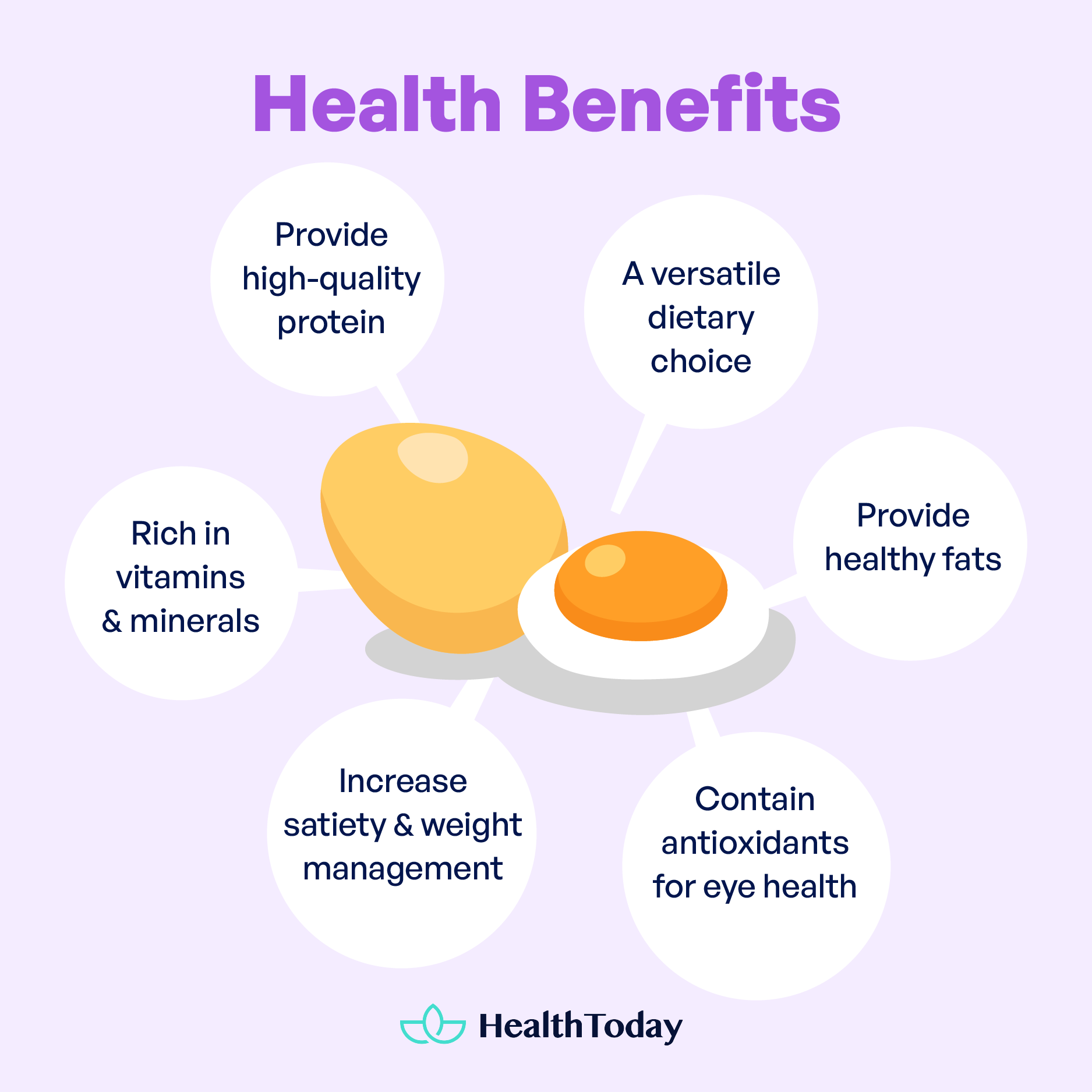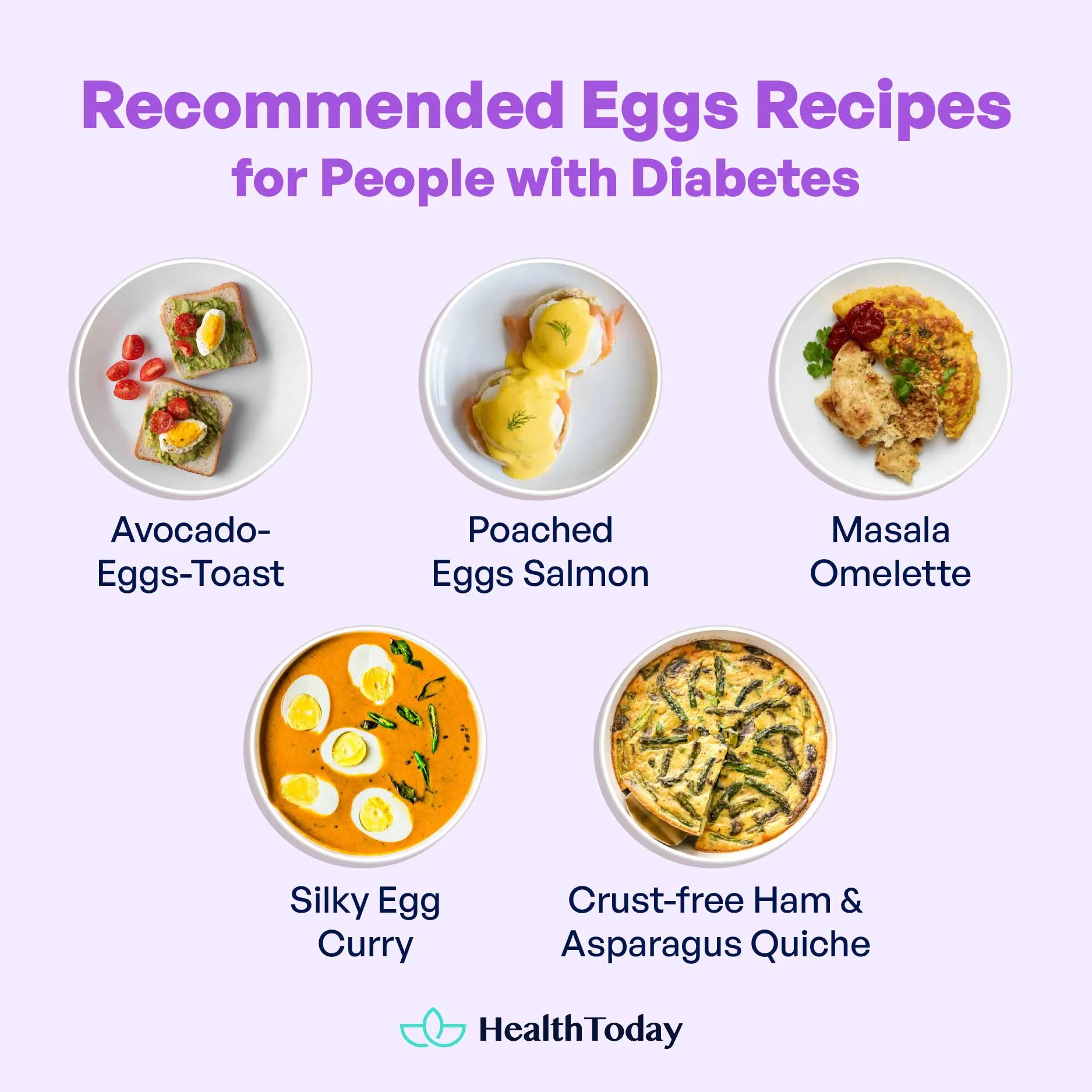Table of Contents
Are eggs good for diabetes? This question often takes center stage in the diabetes discussion.
In recent years, researchers have managed to shed light on the relationship between eggs and diabetes, particularly focusing on aspects such as glycemic index and sugar content. This article provides a clear understanding of the impact of eggs on diabetes and answers questions like “Do eggs spike insulin?” and “Can diabetics eat eggs?”.
Eggs: Nutritional facts
Eggs are a dietary staple, a versatile food source that complements different dietary goals; they’re good for blood sugar management, protein intake, and overall nutrient enhancement (1).

Glycemic index of eggs
Eggs have a glycemic index of 0 (2, 3) because of low carbohydrate (sugar) content. Thus, they have a slight impact on blood sugar levels (3), making them suitable for people with diabetes and their carbohydrate intake. Eggs don’t cause a significant increase in blood glucose levels, even when you eat many (3).
Do eggs have sugar?
Eggs contain almost no sugar, which contributes to their low glycemic index. A 100 g whole hard-boiled egg contains 1.12 g of sugar (4). Among fructose, lactose, maltose, and galactose, glucose is the main free sugar found in eggs (5). Thus, eggs become an excellent choice for people who want to control their sugar intake.
Benefits
Eggs contain high-quality protein, and essential amino acids, which are needed for bodily functions (6, 7). They are also rich in vitamins and minerals such as vitamin D, B vitamins, selenium, and choline, which help improve brain health (8, 9, 10, 11).
Eating eggs also helps increase satiety and promote weight management because of their high protein content. So it’s best to include eggs in your meal plan (12).
Eggs also contain antioxidants lutein and zeaxanthin (13), which have been shown to be good for eye health (14, 15, 16). Healthy fat in eggs contributes to improving overall health (8).
Whether you’re following a low-glycemic diet, focusing on protein-rich foods, or striving to enhance nutrient intake, eggs are versatile and a great choice. The minimal effect on blood sugar, combined with the wide array of nutrients, makes eggs a cornerstone of a balanced and health-conscious diet.
Eggs and diabetes: Are they okay for diabetics?
Individuals with diabetes often wonder if eggs are a suitable addition to their diet. The question of “Are eggs good for diabetes?” remains a concern despite the health benefits that they offer.
Do eggs raise blood sugar and insulin?
The protein and healthy fats in eggs may help regulate insulin response (17). However, individual responses can vary.
It’s advisable for individuals with diabetes to work with a healthcare professional or dietitian to create a well-balanced meal plan that aligns with specific health needs and goals. Eggs seem to be well-tolerated by many diabetics; people with diabetes should consider their condition and determine their optimal consumption.
Eggs and diabetes type 2
The research on questions, “Are eggs OK for diabetics?” or “Are they indeed beneficial?” remains a topic of interest. The effects of eggs on glucose metabolism and insulin sensitivity affect diabetes management and blood sugar control.
Studies suggest that eggs may not only be safe but also offer potential benefits for managing diabetes type 2 (18, 19, 20, 21). The protein and healthy fat content of eggs may also help improve insulin sensitivity and glucose metabolism and contribute positively to blood sugar control (22)
Other studies suggest that eggs have limited effects on people with diabetes and insulin resistance (23, 24). However, other studies suggest daily egg consumption is associated with an increased risk of diabetes (25, 26).
How many eggs can a diabetic eat in a day?
The number of eggs that people with diabetes can safely consume is a concern for people with diabetes because diabetes management requires a balance between nutritional needs and dietary restrictions. Individual factors such as overall dietary patterns, blood sugar control goals, and existing health conditions will affect your optimal egg intake.
Eggs don’t cause a significant rise in blood sugar, but portion control remains important. People with diabetes can enjoy several eggs per week, up to two eggs per day, depending on individual conditions. It’s recommended to include eggs with various foods to ensure a balanced and nutrient-rich diet.
How should diabetics eat eggs for breakfast?
Eggs can provide a satisfying and healthy start to the day, but how can diabetics make the most of their egg-based breakfast options while keeping blood sugar in check? Let’s find out the answers!
Are hard-boiled eggs good for diabetics?
Boiled eggs emerge as an excellent breakfast choice for people with diabetes. The hard-boiled egg doesn’t need added fats and ensures a low-calorie and low-carb option that helps keep blood sugar stable. Besides, their convenience and portability make them an excellent choice for busy mornings or as a nutritional snack throughout the day.
People with diabetes might ask, “How many hard-boiled eggs can a diabetic eat?” An appropriate portion of hard-boiled eggs hinges on individual factors such as nutritional needs, activity levels, and blood sugar goals. Including one or two hard-boiled eggs in breakfast can be a good approach (27), especially when combined with fiber-rich foods like vegetables or whole grains.
Poached and scrambled eggs can be good options when prepared without excessive fats and with healthy oils. Including vegetables in scrambled eggs adds fiber and nutrients, which might improve glycemic control.
You should consult a healthcare professional or registered dietitian to have the best-personalized guidance on egg intake and ensure a balanced and diabetes-friendly breakfast.
Can diabetics eat bacon and eggs?
Bacon and eggs are a classic breakfast duo, and its compatibility with diabetes management is worth trying. Bacon is high in saturated fats and sodium, which may impact heart health (28). Moreover, people with diabetes are at an increased risk of heart disease, which could worsen their diabetes. (29).
The question, “Can diabetics eat eggs and cheese together?” arises among other concerns for people who manage diabetes. Eggs and cheese can be part of a wholesome breakfast, but mindful portioning is advised because of the fat and calories from cheese. Opting for low-fat cheese varieties can help create a satisfying yet diabetes-friendly breakfast.
Recommended recipes with eggs
Eggs are a fantastic source of high-quality proteins and nutrients while being relatively low in carbs, which is a diabetes-friendly choice. We have collected some recipes below that can satisfy your egg cravings while still keeping your blood sugar levels stable and supporting your well-being.

Avocado-Eggs Toast
A whole-grain bread layered with avocados and egg on top can be a good option to start your day. This simple recipe can’t go wrong and will provide you with essential nutrients. This dish is a symphony of flavors, merging the creamy avocados and eggs. You can be really creative by adding things like tomato or salmon to level up your simple bread.
Poached Eggs Salmon
Poached eggs and the smoked salmon combination might offer you an amazing taste. Whether it’s a perfect brunch or a simple breakfast, this dish will offer you a great dining experience and provide the proteins you need to maintain overall health.
Masala Omelette
You’re not a fan of toast but omelettes? Then you might want to try this vegetable omelet. It is a vibrant and satisfying combination of eggs, vegetables, and flavorful spices. Masala Omelette celebrates the magic of spices and the art of perfecting an egg-centric delight.
Silky Egg Curry
This recipe is a harmonious fusion of flavors, where the velvety eggs meet aromatic spices, creating a full of flavors that are nothing short of enchanting. With every bite, you’ll be amazed by the rich and luxurious texture of the curry as it delicately envelopes the eggs.
Crust-Free Ham and Asparagus
Enjoy the rich flavors of quiche with our ham and asparagus quiche. Although this recipe takes out the crust, the rich flavor of quiche with ham doesn’t change. With each forkful, you’ll savor a harmony of textures of tender asparagus, savory ham, and the creamy eggs that melt in your mouth. It’s a perfect Sunday brunch dish!
Do eggs have carbs or sugar?
Eggs are low in carbohydrates and sugar. They are primarily comprised of protein and healthy fats. A typical large egg contains less than one gram of carbohydrates, which makes eggs a good choice for people who are managing their carbohydrate intake.
Can diabetics eat deviled eggs?
Yes, diabetics can generally enjoy deviled eggs as part of their diet. Deviled eggs are made from hard-boiled eggs filled with a mixture of mayonnaise and seasonings. However, it’s important to be mindful of portion sizes and ingredients used, as it may be high in fat.
Can a diabetic patient eat egg yolk?
Yes, people with diabetes can definitely eat egg yolks. Egg yolks are a good source of various nutrients, including essential vitamins, minerals, and healthy fats. They don’t significantly impact blood sugar levels, as they contain minimal carbohydrates. But portion control and overall dietary balance are also important.
Are eggs good for prediabetes?
Yes, eggs can be a good food choice for individuals with prediabetes because of their low carbohydrate content. They are rich in high-quality protein and healthy fats, which keep you full longer and stabilize blood sugar. Including eggs in a balanced diet for prediabetes can provide essential nutrients and support overall health.
Can diabetics eat 2 eggs a day?
Yes, people with diabetes can safely consume up to 2 eggs a day. Eggs are a nutritious source of nutrients and have a minimal impact on blood sugar levels. Individual’s dietary needs can be varied; it’s important to consider other aspects of your diet, such as carbohydrate intake and overall calorie consumption.
Summary
In a nutshell, can diabetics eat eggs? Yes, owing to their low glycemic, high protein, and healthy fat content. Some research shows eggs have a positive impact on diabetes management, while others show zero to negative impact on people with diabetes.
Eggs have minimal impact on blood sugar levels and can support overall health. Diabetics can safely eat up to two eggs per day on a regular basis, but they should consult with their nutritionist.

















Comments
0